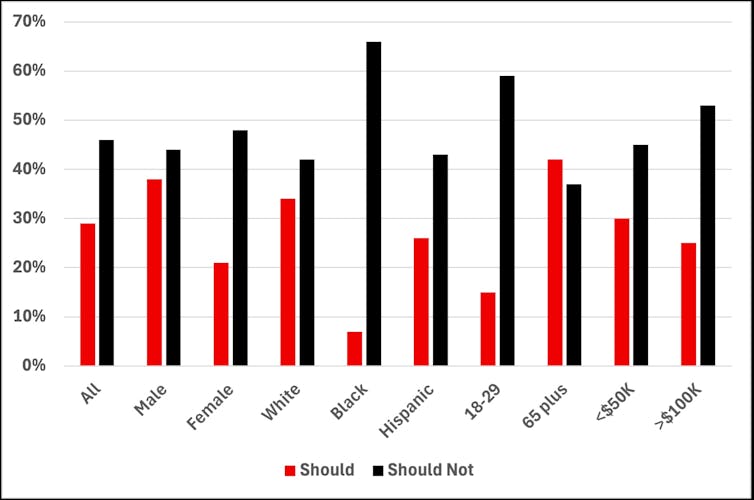Political scientists first identified a phenomenon known as the “rally round the flag” effect in the 1970s . This refers to the tendency for the US public to increase their support for a president when the county becomes involved in conflicts abroad. After the massive air strikes on Iran’s nuclear sites, the question is whether the US bombing missions will boost support for Donald Trump.
An Economist/YouGov poll conducted between June 19 and June 23 suggests that it is unlikely that the Trump administration will experience a “rally round the flag” event after the US air strikes on June 22.
The survey asked: “Do you think the U.S. military should or should not bomb Iranian nuclear facilities?” Some of those surveyed would have answered before the raids took place, while others were responding afterwards.
Altogether around 29% supported the bombing, with 46% opposed and 25% not sure. The chart identifies big differences between groups in their opinions about the raid though. There’s a considerable gender divide. with 38% of men supporting the action (44% opposed), but only 21% of women in favour (48% opposed).
In relation to ethnicity, 34% of white people supported it and 42% opposed the raid. In contrast black people were much more likely to oppose (66%), with just 7% supportive. Among Hispanics 26% supported and 43% opposed the bombing.
There was also a wide divide in opinions among age groups, with only 15% of those aged between 18 to 29 supporting the air strikes and 59% opposing them. This was the highest level of opposition from any age group. This chimes with a general lack of support for Trump from this generation, with a massive 70% saying, in the same poll, that the country was heading in the wrong direction.
In contrast, those over the age of 65 were more in favour, with 42% supporting the military action and 37% opposing. This was the only age group in which supporters outnumbered opponents.
Read more:
Will Trump’s high-risk Iran strategy pay dividends at home if the peace deal holds?
The group most opposed to the bombings were those with annual incomes over US$100,000 (£72,813), with 53% opposing and only 25% supporting. The lowest income group (those earning less than US$50,000) and middle income group (earning more than US$50,000 and less than US$100,000) had very similar views, with 30% and 31% supporting the attack respectively, and 45% and 46% opposing it.
Should the US military bomb Iranian nuclear facilities?

Author’s graph based on Economist/YouGov data, CC BY-ND
Perhaps the most interesting statistic is what those who voted for Trump in the presidential election last year thought about the president’s decision to attack Iran. Around half, 51%, of them supported the bombing, with 24% opposed. In the case of Harris voters only 10% supported the action while 70% opposed it.
We can get some idea of what prompts these responses by probing into the overall confidence the American people currently have in the Trump administration. There has been a gradual decline in the president’s job approval ratings, currently about 40% approve and 54% disapprove of his performance in the job. This compares with 43% approving and 51% disapproving in the Economist/YouGov survey published a month ago on May 19. Back on March 20, 48% of Americans approved of his job performance, while 49% disapproved.
When asked if they have a favourable or unfavourable view of Trump, 41% say the former and 54% the latter. This has also become slightly more negative since the Economist’s survey in May, when 44% felt favourably and 53% unfavourably.
Worries about a world war
It appears than many Americans are becoming afraid for the future of their country’s role in a war. Respondents were asked if they thought there was a greater or lesser chance of a world war compared with five years ago. Around 58% thought the chances were greater, compared with only 11% who thought they were lower.
A similar question asked if they thought the chances of a nuclear war were greater or lesser than five years ago. This produced a rather similar set of responses. No less than 52% thought there was a greater chance with only 12% thinking that the chances were lower.
The final and in many ways the most striking responses of all related to the question: Do you think that things in this country today are under control or out of control? A surprising 65% thought they were out of control and only 21% thought the opposite. This suggests that Trump’s erratic behaviour has started to spook Americans on a large scale, since they do not know, in line with national leaders around the world, what he will do next.




